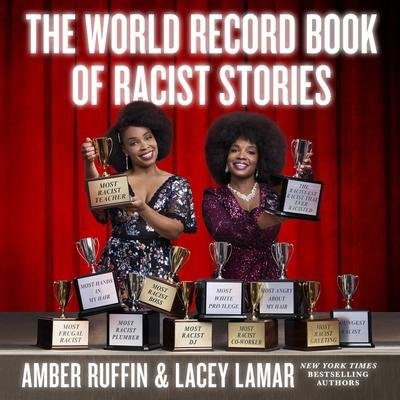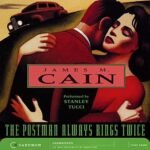General
“Recounting the wildest tales of racism from their parents, their siblings, and Amber’s nieces and nephews, this intergenerational look at ludicrous (but all too believable) everyday racism will have you gasping with shock and laughter in turn.”
Amber Ruffin and Lacey Lamar return with The World Record Book of Racist Stories, a follow-up to their bestselling You Won’t Believe What Happened to Lacey. In this new installment, they expand beyond Lacey’s personal experiences, sharing jaw-dropping encounters from friends and family.
Ruffin, a writer for Late Night with Seth Meyers and host of The Amber Ruffin Show, brings her signature wit and storytelling prowess, while Lamar delivers sharp observations and exasperation at the absurdity of it all. The result is a book that is as hilarious as it is infuriating, using humor as a lens to examine everyday racism.
This book is both cathartic and validating. Some stories will leave you shaking your head in disbelief, while others will have you laughing at how ridiculous—and yet painfully real—these situations are. More than just a collection of anecdotes, this book underscores how racism is woven into the fabric of daily life, even in spaces that claim to be inclusive.
Lens on Storyline Specs
Unlike a traditional memoir, the book is structured like an awards show, with stories categorized under humorous “award titles” such as “Best Example of Why We Need Diversity Training at Diversity Training” and “Most Frugal Racist.” This creative approach adds a satirical layer that emphasizes the absurdity of these encounters.
One of the most striking aspects of the book is how many of Lacey’s new experiences occurred after their first book became a bestseller. Instead of self-reflection, some readers of the first book immediately turned around and told her something equally problematic—while thinking they were being supportive. This highlights not just the persistence of racism but also the lack of awareness among those who believe themselves to be allies.
Ruffin and Lamar also take an intentional approach by not over-explaining why something is racist. They trust the reader to recognize the issues without spelling them out, allowing for deeper engagement and reflection.
Lens on Big Ideas
At its core, The World Record Book of Racist Stories isn’t an educational guide—it’s a release. Ruffin and Lamar aren’t here to provide a how-to manual on allyship. Instead, they present their lived experiences and let readers come to their own conclusions.
The book highlights the exhausting emotional toll of racism, particularly in the form of microaggressions and casual discrimination. Yet, through humor and community, the authors demonstrate how storytelling can be a tool for survival. One of the most powerful takeaways is Amber Ruffin’s explanation that this book exists not to teach, but to let go. It is a space for Black people to share, process, and move forward without carrying the weight of these experiences indefinitely.
Lens on Time and Place
While the book is deeply personal, it reflects broader societal realities. Racism doesn’t just exist in the distant past or in extreme, overt forms—it is embedded in everyday interactions, from the workplace to shopping trips.
What’s particularly revealing is how often these encounters happen in spaces that are supposed to be progressive. Many of the most frustrating stories come from people who consider themselves allies but fail to recognize their own biases. The book serves as a reminder that performative allyship is not enough; awareness and action are necessary to dismantle systemic issues.
Lens on You (Action and Impact)
Even though The World Record Book of Racist Stories is filled with humor, it doesn’t diminish the real and lasting impact of microaggressions. While Amber and Lacey take these moments in stride, they still highlight how exhausting it is to experience them constantly. Microaggressions may seem small or unintentional, but they accumulate, affecting a person’s emotional well-being, mental health, and sense of belonging.
I encourage readers to take the time to learn about microaggressions—not just those that affect Black and African American communities, but also those that impact any marginalized group. Racism, sexism, ableism, homophobia, and other forms of discrimination all show up in subtle ways, often masked as innocent comments or jokes. Recognizing them is the first step; knowing how to respond is the next.
Beyond awareness, I challenge readers to learn tools that help them be effective allies. It’s not enough to notice when something is wrong—intervening is crucial. If you see a situation that doesn’t feel right, don’t stay silent. Speak up when someone makes an offensive remark. Support colleagues, friends, or even strangers when they’re in uncomfortable situations. Sometimes, allyship means using your privilege to advocate for others, even when it’s inconvenient.
For me, I know I can be better at intervening and showing support. There have been moments where I recognized something inappropriate happening but hesitated to say something. This book reinforced that I can and should do more. It also reminded me of the importance of listening—not just when someone shares a personal story but also when alarm bells are being raised about harmful laws, policies, or systemic issues. Too often, when marginalized groups warn about the dangers of a new policy or societal shift, they’re dismissed—until the consequences become unavoidable. When someone raises concerns, listen. Take their concerns seriously.
Being an ally is an ongoing process, and it requires constant learning, unlearning, and action. The World Record Book of Racist Stories is a reminder of just how much work there is to do.
Who Should Read This?
- Fans of humor-infused social commentary
- Anyone seeking an unfiltered look at everyday racism
- Readers who appreciate books that balance humor with cultural critique
- Those looking for a book that is equal parts validating and thought-provoking
Recommendations
If you enjoyed The World Record Book of Racist Stories, consider reading:
- Hood Feminism by Mikki Kendall- A powerful examination of how mainstream feminism often overlooks the needs of marginalized communities.
- So You Want to Talk About Race by Ijeoma Oluo – A thoughtful and accessible guide to discussing race and systemic injustice.
Closing Thoughts
The World Record Book of Racist Stories is an essential read—equal parts hilarious and maddening. Ruffin and Lamar use humor to expose the absurdity of racism while offering a space for reflection and validation.
For the best experience, I highly recommend the audiobook, narrated by the authors. Their chemistry, banter, and spontaneous musical interludes make it feel like you’re sitting with two friends, sharing stories over brunch.
Have you read this book? Share your thoughts in the comments!











